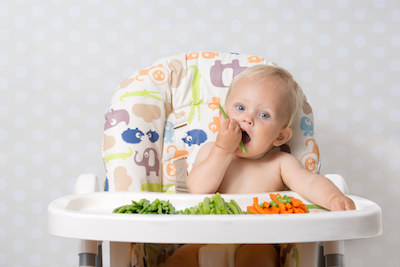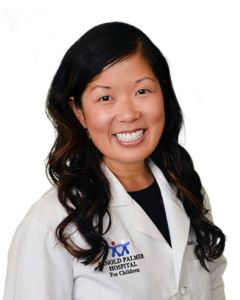When Should My Baby Start Eating Solid Foods?
In the past, the American Academy of Pediatrics (AAP) has recommended that babies should be introduced to solid foods between the ages of 4 to 6 months. This recommendation was recently changed, and now the AAP recommends that babies start eating solid foods at about 6 months of age. A study published by the AAP in the journal Pediatrics in March 2013 showed that many mothers (approximately 40%) were introducing solids to their babies before the age of 4 months.
Many parents and caregivers may be thinking, why do we need to wait about 6 months before giving solids? The recent study describes many reasons why mothers started feeding solids earlier than 6 months - My baby was still hungry, my baby is old enough to start eating solid foods, a healthcare professional or family member said my baby should start eating solids, or I wanted her to sleep better at night. All of these thoughts and advice have good intentions, and previously we thought it was okay if a baby starting eating solid foods a little earlier than 6 months. Since starting solids too early is not the best for a baby’s health, this study helps us as healthcare providers because it is important to understand the reason why mothers start giving their babies solid foods early.
Remember that some healthcare professionals may have trained at a time when it was thought that babies could eat solid foods earlier, and it is difficult to change perspectives overnight since medical recommendations can change very quickly. As pediatricians, we now have more information from research and are concerned when babies start eating solid foods earlier because that can impact their overall health as they grow.
From a development standpoint, most babies (especially those younger than 4 months old) are not truly ready to eat solid foods. To eat solid foods, babies should be able to sit up, hold her up head up, open his mouth when food is approaching on a spoon, and swallow the food. When babies are born, they actually have a “tongue-thrust” reflex that will actually discourage them from eating solid foods because the tongue will instinctively “push” solids out of a baby’s mouth. This reflex helps to show us that babies that are too young should not be eating solid foods.
 Research has also showed a possible increased risk in some chronic diseases in babies that start eating solid foods early. Some of the chronic diseases that are associated with an early introduction of solids include diabetes, obesity, eczema, and celiac disease. Starting solid foods early also means the end of exclusive breastfeeding early.
Research has also showed a possible increased risk in some chronic diseases in babies that start eating solid foods early. Some of the chronic diseases that are associated with an early introduction of solids include diabetes, obesity, eczema, and celiac disease. Starting solid foods early also means the end of exclusive breastfeeding early.
Since breast milk has many positive health benefits for babies such as a lower risk of respiratory and ear infections, diarrhea, diabetes, obesity, and sudden infant syndrome, we highly recommend that babies receive exclusive breast milk for as long as possible. The AAP currently recommends that babies receive nothing but breast milk for the first 6 months of life, introducing solid foods at about 6 months, continuing breast milk for at least 12 months, and after that as long as the mother and child mutually desire.
A crying baby is not always a hungry baby. If you know that your baby has been recently fed an appropriate amount, don’t necessarily assume that she might still be hungry if she is still crying. She may need a diaper change, she might want to be held or need a change of scenery, or she might be getting sick.
If you have any other questions or concerns about when your baby should start eating solids, your pediatrician or family physician will also be available to support you and answer your questions.







